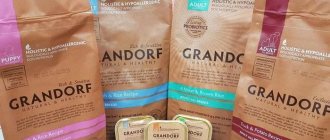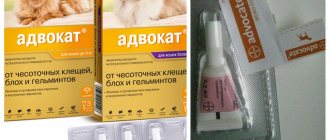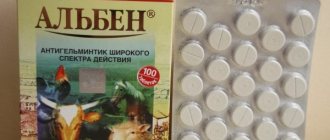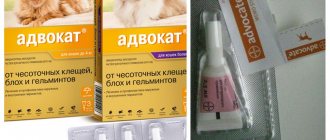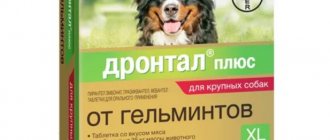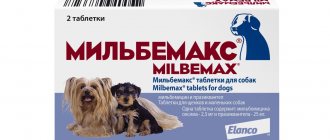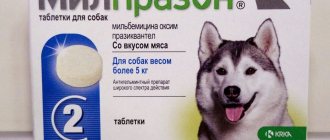Spending on anti-worm medications is an integral expense for every dog owner. Even if the dog does not have them, prevention of helminths 2-4 times a year is mandatory. Before purchasing and administering such medications, they will learn many nuances: what forms of release and composition are available, which companies are better, how to choose a remedy for a specific animal and feed it.
I will talk about all this in a review of 17 popular anthelmintic drugs for dogs.
At the end of the article there is brief information about the best tablets, which are the most optimal in terms of price/quality, and which are suitable for small puppies. If you want an immediate answer, skip to the conclusion.
Prices and information about drugs are current as of November 2022 and are constantly updated.
What are worms and what types are they?
Helminths or worms are internal parasites that live not only in animals, but also in humans. By multiplying inside the body, they cause considerable damage to health. Contrary to popular belief, they parasitize not only the stomach and intestines, but other organs:
- heart;
- brain;
- lungs;
- liver;
- bladder.
The location of the helminth in the body depends on its type and stage of development. There are so many types of worms that a whole book would not be enough to describe them. However, all types are divided into three classes:
- Roundworms.
- Tapeworms.
- Trematodes (flukes or flatworms).
This is important to know, since the active ingredients in anthelmintic drugs differ precisely in the degree of impact on different classes of worms.
Damage caused by worms to the body
By parasitizing a dog's body, worms cause significant harm to the pet's health.
Worms feed on the physiological components of the body of their host in which they live. And all the remains of their vital activity are excreted in the same place where they parasitize. Toxic substances entering the bloodstream have a poisonous effect. This worsens the dog’s well-being and causes a detrimental effect on the condition of the entire body.
Helminthic infestations have a damaging effect on internal organs, disrupt metabolism, reduce immunity, and cause severe intoxication of the body.
If there is a large accumulation of worms in the intestinal lumen, they can cause blockage and obstruction. With such a complication, the dog may require urgent hospitalization and surgical intervention in order to prevent death.
Types of worms
Despite the huge number of different parasites, there are several types of worms that dogs most often become infected with:
Parasitizes the small intestine
- Round helminths: Ancylostoma caninum (Hookworm), Strongyloides stercoralis (Strongylids), Toxocaris leonine (Toxocara), Toxocara spiralis, Uncinaria stenocephala.
- Tapeworms: Diphyllobothroum latum, Dipylidium caninum, Echinococcus granulosus, Mesocestoides spp/Multiceps multiceps, Spirometra, Taenia spp.
Parasitizes the large intestine
- Roundworms: Trichuris vulpis, Trichuris serrata.
Parasitizes in the stomach
- Roundworms: Gnathostoma, Spirocerca, Physaloptera.
In the liver
- Trematodes: Opisthorchis.
In the heart and lungs
- Roundworms: Dirofilaria immitis, Fillaroides, Capillaria aerophila, Toxocara canis (larvae).
Brain
- Roundworms: Angilostrogylus cantonensis.
Bladder
- Roundworm: Capillaria plica.
Types of helminths
Main types of parasites:
- Cestodes.
- Nematodes.
- Trematodes.
Tapeworms (cestodes)
Flat tape parasites develop in the dog's intestines. They attach themselves to the intestinal walls with suction cups and damage its surface. Where the parasitic worm attaches, an ulcer forms. The parasite's offspring grow and develop rapidly. Some long worms can reach 8-9 meters. The dog's gastrointestinal tract becomes clogged with worms - this leads to exhaustion, and a sad outcome is possible.
Most often, infection occurs from fleas, lice, and lice. Parasitic insects ingest tapeworm eggs, which begin to mature inside them. Cestode larvae enter the pet's body along with an accidentally eaten flea. The dog's intestines are an ideal environment for the development and reproduction of the parasite. The danger of the disease is that it can be asymptomatic for several years. All this time the dog is contagious.
Symptoms of cestode infection:
- Loss of appetite.
- Depressed or excited state.
- Hypovitaminosis of vitamin B12.
- Signs of gastrointestinal dysfunction appear: vomiting, diarrhea, constipation.
- Pernicious anemia.
- Decreased skin elasticity.
- Chronic dermatitis.
- Nervous attacks.
- An excessively bloated abdomen against a background of general exhaustion of the animal.
Roundworms (nematodes)
Roundworms parasitize the tissues and organs of the dog, most often the gastrointestinal tract, cardiovascular system (heartworms) and lungs (lungworms) are susceptible to infection. Nematodes are the most common helminths. Parasites penetrate the brain and heart and can rupture the intestinal walls or clog it completely, causing obstruction. The disease is considered fatal. There are frequent cases of death from intestinal volvulus, necrosis and peritonitis.
Symptoms of nematode infection:
- Alternating constipation and diarrhea. Uncontrollable diarrhea, yellow stool with mucus and blood. Pieces of helminths or whole individuals are found in the feces.
- Vomit. The attacks are uncontrollable - the dog vomits worms.
- Increased appetite, while the dog is exhausted.
- The dog rubs its anus on the floor, continuously reaching for its tail with its teeth.
- Food perversions - the dog eats soil, chews boards.
- Dermatitis and allergic reactions.
- Developmental delays in young animals.
- A swollen belly against the background of general exhaustion of the puppies.
- Sudden severe cough.
Flukes (trematodes)
Trematodes are parasites that are localized in the liver and bile ducts of dogs. Infection of a pet occurs through water, raw fish or seafood. The parasite attaches itself to internal organs with its suction cups. Mature individuals reproduce quickly and reach sizes of 20 cm.
The danger of infection is that due to the activity of worms, the integrity of the bile ducts is disrupted, which complicates the natural outflow of bile and pancreatic secretions. As a result, dogs develop cirrhosis of the liver, jaundice and other inflammatory phenomena. A fatal outcome cannot be ruled out.
Symptoms of trematodosis:
- Depressed state.
- An enlarged liver can be felt by palpation.
- A series of diarrhea and constipation.
- Exhaustion.
- Jaundice.
- Uncontrollable vomiting.
- Labored breathing.
- Increased body temperature.
- Nervous attacks.
With all types of infection in dogs, a blurred clinical picture is observed. Parasites can multiply asymptomatically in the body of a beloved pet for a long time, which is why it is so important to get tested for worms and carry out timely antiparasitic treatment of the animal.
How do you get infected with worms?
The mechanism of infection is that the helminth, at a certain stage of its development, depending on the species (these can be both eggs and larvae), comes out of the sick animal (for example, with feces or saliva) and eventually enters the body of a healthy dog.
There are many variations of infection:
- A dog can eat meat from an animal with helminthiasis. It may contain worm eggs that are not visible to the naked eye.
- Upon contact with an infected animal.
- Walking on the street. It doesn’t matter in the forest or on a special site. Infested animals release worm eggs into the environment. There is danger wherever other animals live.
- Even if your dog stays at home, doesn’t go outside, eats dry food and never comes into contact with other animals, the risk of helminthiasis cannot be ruled out. The source could be your outdoor shoes. The particles of soil that you bring into your home on your soles can contain worm eggs.
Thus, only a properly selected preventive treatment product can completely protect your pet from helminthiasis.
Signs
An attentive owner can, without visiting a veterinary clinic, understand that his beloved pet has worms; all he needs to do is watch him.
There are several main signs of infection:
- changes in habits and behavior: lethargy, apathy, tendency to dermatosis and eczema;
- changes in the gastrointestinal tract: decreased appetite or good appetite due to weight loss, changes in taste preferences, vomiting, diarrhea, constipation;
- the presence of blood, mucus, larvae or worms themselves in the stool;
- swollen and hard belly, protruding ribs;
- developmental and growth retardation;
- difficulty swallowing;
- itching of the anus (the dog “rides” on the back of the body in an attempt to get rid of it).
The essence of deworming
Deworming can be carried out for therapeutic and preventive purposes. Its essence is to expel parasites from the animal’s body.
The mechanism of action of an anthelmintic depends on the active substance; basically, they either disrupt the metabolism of the parasite or lead to its paralysis.
Do not forget that anthelmintic drugs are poison. One dose contains a safe amount of product for a pet, but quite lethal for the parasite. The main thing is to follow the instructions.
If your dog has been laboratory confirmed to have helminthiasis (the presence of worms), then treatment should be aimed specifically at the type/class of parasite that has affected your pet. In this case, the veterinarian will prescribe treatment.
For prevention, it is better to use broad-spectrum drugs. Preventive treatment should be carried out once every three months.
If your dog does not go outside for some reason and eats exclusively dry food (not natural food). You can carry out preventive treatment once every six months, but you cannot neglect it completely.
Preventive actions
Unfortunately, it is not possible to completely prevent a dog from becoming infected with worms. However, the risk of helminthiasis can be significantly reduced with the help of basic preventive measures.
- Deworm your pet in a timely manner, observing the timing and dosage.
- Periodically test feces for helminthiasis, even in the absence of corresponding symptoms.
- Eliminate raw fish and tripe from your diet. Process raw meat with boiling water.
- Do not allow your dog to drink from puddles or open water or pick up pieces of food on the street.
- Promptly identify and destroy blood-sucking insects. Treat the animal with products for external use.
- Avoid unnecessary “acquaintances” with your pet.
- Regularly wash your dog's bedding and water and food bowls.
Review of anthelmintic drugs for dogs
There is a huge selection of antihelminthic drugs on the market. We will help you navigate and choose a drug that is suitable for your pet and will be easy to use.
So, the choice of anthelmintic drug should be based on two main points:
- Release form of the drug. Anthelmintics are presented in the form of tablets, drops on the withers, suspensions and pastes. For example, tablets are most often designed for dogs from 5 to 10 kg, while for puppies and small breeds a suspension is better suited (it is easier to calculate the dose). For dogs that cannot easily be given a tablet, drops on the withers are suitable.
- Active substance. This is the most important thing to consider when choosing a product. If during therapeutic deworming you already know which parasite has infected your pet, the choice of drug is based on this. For preventative treatment, you need a drug that works against several types of worms. Consider the safety of this active ingredient specifically for your pet, i.e. dog's age, breed and physiological condition.
What to do if the dog is already infected
As mentioned above, puppies can get worms from their mother even before birth, and deworming puppies has its own characteristics. In this regard, there is a need to deworm a newly acquired puppy, at least for prevention, even if no symptoms of infection are observed.
In this case, you must follow several rules:
- If you plan to deworm your dogs before vaccination, be sure to inform your veterinarian about possible helminths, he will select a remedy for this case.
- It is best to carry out deworming between February and March; at this time, deworming of dogs is most effective.
- Only an otherwise healthy pet can be treated for fleas; even fleas should be treated before the procedure, otherwise the drug should be prescribed by a doctor.
- Depending on the breed, some individuals may not tolerate deworming medications well; check this with your veterinarian.
- Be sure to check whether the bitch received prophylaxis before pregnancy; the time of the first dose of medication will depend on this.
The most popular anthelmintic drugs
Attention! Before use, consult a specialist.
Deworming tablets
Drontal plus
| Name | Description | pros | Minuses |
| "Drontal Plus" | It contains three active ingredients: Febantel, Pyrantel and Praziquantel, so the drug is active against tapeworms and roundworms, as well as against the protozoa - Giardia (giardiasis is a common disease, contagious to humans). | Wide spectrum of action. Works against Giardia! Suitable for all breeds and ages (puppies from two weeks). Suitable for lactating bitches. High efficiency. | Available in only two dosages (1 “bone” tablet per 10 kg of weight and 1 “oval” tablet per 35 kg of weight). You will have to divide the tablet yourself according to the weight of your pet. Do not use during pregnancy. |
Kanikvantel plus
| Name | Description | pros | Minuses |
| "Kaniquantel plus" | The active ingredients are praziquantel and fenbendazole. Therefore, they are active against round and flatworms (trematodes). | High efficiency in mixed invasions. Can be used on both dogs and cats. Can be lactating. The instructions allow puppies from 3 weeks. | Available in only one dosage - 1 tablet per 10 kg of weight. Not for pregnant females. It is not recommended for prophylaxis; it is better to use it for treatment, since the dose of the drug is quite high. |
Dehinel plus
| Name | Description | pros | Minuses |
| "Dekhinel plus" | In terms of active ingredients, it is a complete analogue of drontal. | The price is lower than that of Drontal Plus, and the active ingredients are the same and in the same quantity. | Available only in a dosage of 1 tablet per 35 kg of weight. Therefore, it is not recommended to feed dogs less than 17.5 kg. It is difficult to correctly divide the tablet into 3 or more parts; you can make a mistake and the drug will not be fully effective). |
Enwire
| Name | Description | pros | Minuses |
| "Enwire" | The active ingredients are the same as in Drontal, but the dosage has been changed. | Wide spectrum of action. | Available only in a dosage of 1 tablet per 10 kg of weight. Not for pregnant women and during lactation. Not recommended for puppies (according to the instructions, from 1 month), old and weakened adult animals. |
Profender
| Name | Description | pros | Minuses |
| "Profender" | Contains praziquantel and emodepside as active ingredients. Active against round and tapeworms. | Wide spectrum of action. Allowed for pregnant and lactating females. | Not allowed for puppies under 12 weeks and dogs weighing less than 1 kg. Available only in a dosage of 1 tablet per 10 kg of weight. |
Milbemax
| Name | Description | pros | Minuses |
| "Milbemax" | Contains milbemycin oxime and praziquantel as active ingredients. Active against round and tapeworms. | A separate dosage is available for puppies and small breeds - from 0.5 to 5 kg, for medium and large breeds from 5 to 25 kg. High efficiency. | Not recommended for Collie, Bobtail and Sheltie breeds. Not recommended for pregnant and lactating women. Do not use if you have impaired renal or liver function. |
Pratel
| Name | Description | pros | Minuses |
| "Pratel" | The active ingredients are pyrantel embonate and praziquantel. Active against round and tapeworms at all stages of development. | Quite high efficiency. Suitable for both dogs and cats. Puppies can start from 6 weeks. | Available only in a dosage of 1 tablet per 10 kg of weight. |
Alben S
| Name | Description | pros | Minuses |
| "Alben S" | The active ingredients albendazole and praziquantel are active against all stages of development of tapeworms and roundworms. | Fairly high activity. Low price. | You need to be VERY careful with the dosage. There are tablets calculated as 1 tablet. per 5 kg of weight, and there is 1 tab. by 35 kg of weight. This is convenient, but if you mix something up, the consequences can be disastrous. A large number of negative reviews. |
Drug selection criteria
If helminths are suspected, take the dog to the veterinarian. He will examine the pet, take feces to determine the type of worms and, based on the tests, select a medicine with a suitable pharmacological effect.
This is what the ideal choice of anthelmintic drug looks like. But in practice, 90% of animal owners go to the first pet store or pharmacy they come across and ask for something for worms. This is where the criteria for choosing medications will come in handy for owners. Take into account:
- the weight of the pet – the dosage depends on it;
- age – medications are produced only for adult dogs, for puppies from 2, 3, 6 or 8 weeks;
- presence/absence of allergies to components;
- date of manufacture of the product;
- how the packaging was stored, is it intact?
It is advisable to know the type of pathogen. Each drug contains specific active ingredients that work against some types of helminths, but are useless against others. Basically, manufacturers of anthelmintic medications use 3 components:
- praziquantel – against flat and tapeworms;
- pyrantel – effective against nematodes, has little or no effect on whipworms and tapeworms;
- febantel – helps against roundworms and hookworms;
- febantel + pyrantel – against whipworms.
However, most owners do not submit their pet's feces to the laboratory - and without a test it is impossible to find out the type of worms. Therefore, I advise you to take a broad-spectrum medication, which contains praziquantel, pyrantel and febantel.
Anti-worm suspensions
Prazicide
| Name | Description | pros | Minuses |
| "Prasicide" | The active ingredients are praziquantel and pyrantel pamoate. Active against tape and roundworms at all stages of development. | Fast action. Easy to find dosage for puppies and small breeds. Low price. | Not for pregnant women. Side effects in case of overdose. |
Procox
| Name | Description | pros | Minuses |
| "Prokoks" | The active substances emodipsid and toltrazuril act against nematodes and coccidia. | Active against coccidia (a common cause of diarrhea in puppies). Can be given to puppies from 2 weeks of age until they reach a weight of 0.4 kg. Available in bottles of 7.5 ml and 20 ml. Easy to calculate dose. | Use with caution in bobtail, collie and sheltie breeds, as they are hypersensitive to emodipsid. |
Febtal combo
| Name | Description | pros | Minuses |
| "Febtal combo" | The active ingredients praziquantel and albendazole are active against round and tapeworms. | Fast action. There are no side effects observed. Can be used for puppies from 3 weeks. Not a high price. | Not allowed during lactation and pregnancy. |
Drontal Junior
| Name | Description | pros | Minuses |
| "Drontal Junior" | The active ingredients febantel and pyrantel embonate are active against roundworms. | Designed for use in puppies - it is convenient to calculate the dosage (1 ml per kg of weight). Suitable for puppies of all breeds. With a small overdose, no side effects were identified. | Not a wide spectrum of action. |
Alben
| Name | Description | pros | Minuses |
| "Alben" | The active ingredients are albendazole and oxyclazonide. | Wide spectrum of action, active against tapeworms, roundworms and flatworms. | More suitable for use on farm animals. High toxicity. Well, dogs don’t need it - it’s dangerous. |
Dironet
| Name | Description | pros | Minuses |
| "Dironet" | The active ingredients are pyrantel pamoate, praziquantel and ivermectin, active against roundworms and tapeworms. | It is convenient to calculate the dosage for dogs of different weights. Wide spectrum of action. | Not for pregnant and lactating bitches. Not recommended for Collie, Bobtail and Sheltie breeds. |
Kanikquantel
| Name | Description | pros | Minuses |
| "Kanikvantel" | The active ingredients praziquantel and fenbendazole are active against roundworms and tapeworms. This is not quite a suspension - it is a gel. | High activity against mixed invasions. It is convenient to calculate the dosage and give, it can be mixed with food. | High price. |
Waiting times for livestock products
For the drug Alben S there is no waiting period for livestock products.
HELMICIDE tablets – obtaining meat products is permitted no earlier than 21 days after deworming. When slaughtered earlier than the established deadline, the meat is used as feed for fur-bearing animals. Milk from dairy animals cannot be used for food purposes for 4 days after deworming. Milk obtained earlier than the established period can be used in animal feed after boiling.
Closalben 10 and 20 – production of meat products is permitted no earlier than 20 days after the end of taking the drug. Animal meat obtained before the end of the specified period is used to feed fur-bearing animals. Closalben 10 and 20 should not be given to dairy animals whose milk is intended for human consumption.
Alvet - slaughter of animals for meat is permitted no earlier than 20 days, birds - no earlier than 5 days after taking the drug. Meat from animals killed before the end of this period can be used as feed for fur-bearing animals. Milk from dairy animals must not be consumed for 4 days after taking Alvet. Milk obtained before the expiration of this period, after heat treatment, can be used to feed animals.
Albendazole 10% granulate - obtaining animal meat is allowed no earlier than 20 days, poultry meat - no earlier than 5 days after taking the drug. Meat products received before the end of the specified period are permitted for use as feed for fur-bearing animals. Milk can be used for food no earlier than 4 days after administration of the drug to dairy animals. Before this period expires, milk can be used as animal feed after boiling.
Albendazole suspension - slaughter of animals for meat after taking the drug is permitted no earlier than 20 days. Meat from animals killed ahead of schedule is allowed to be used to feed fur-bearing animals. Milk from dairy animals cannot be used for food purposes within 7 days after taking Albendazole suspension. Milk obtained earlier than the established deadline can be used as animal feed after heat treatment.
There are no waiting periods for the drug Febtal®-combo for livestock products.
REPTILIFE suspension is not intended for use in productive animals.
Drops on the withers
Advocate
| Name | Description | pros | Minuses |
| "Advocate" | Active ingredients: imidacloprid and moxidectin. The drug is active against roundworms (including heartworms), scabies mites and fleas. | Simultaneous effects on internal and external parasites. Available in doses for dogs up to 4 kg, up to 10 kg, up to 25 kg and more than 25 kg. High efficiency. | Price |
Stronghold
| Name | Description | pros | Minuses |
| "Stronghold" | The active ingredient selamectin is active against roundworms (including heartworms), scabies mites and fleas. | Simultaneous protection against external and internal parasites for a month. It is quickly absorbed, you can bathe within 2 hours after applying the drug. High efficiency. There is a ready-made dosage for dogs less than 2.5 kg. Suitable for both cats and dogs. | Price. |
Inspector Total C
| Name | Description | pros | Minuses |
| "Inspector Total C" | The active ingredients fipronil and moxidectin are active against nematodes, dirofilariasis, scabies and ear mites. | Ready-made doses are available for dogs of different weights. High efficiency. Allowed for pregnant and lactating females. | Price |
Palladium Golden Defense
| Name | Description | pros | Minuses |
| "Palladium Golden Defense" | Active ingredients: imidacloprid and moxidectin. The drug is an analogue of “Advokat”, but with a slightly changed concentration of active substances. | Impact on internal and external parasites. High efficiency. Ease of use. | Price. |
Contraindications for worming
Anti-worm medications are toxic, and their uncontrolled use can cause deterioration in the animal’s health. Deworming has a number of contraindications that must be taken into account. Deworming is contraindicated:
- sick, weak and exhausted animals;
- dogs after surgery;
- puppies up to 2 weeks;
- if the animal has external parasites: fleas, lice, ticks.
Read What to do if your dog is bitten by a tick: signs, consequences and treatment methods
Antihelmintics should be given with caution:
- pregnant and lactating dogs;
- animals with chronic diseases;
- animals prone to allergies.
Sugar cubes and deworming paste
Poliverkan
| Name | Description | pros | Minuses |
| "Poliverkan" | Briquettes of sugar cubes. The active ingredients oxybendazole and niclosamide are effective against roundworms and tapeworms. | Convenient to use and easy to calculate dosage. Wide range of effects. | Not recommended for pregnant women. Not available in all stores. |
Dirofen
| Name | Description | pros | Minuses |
| "Dirofen" | Paste. The active ingredients praziquantel and pyrantel are active against tapeworms and roundworms. | Recommended for prevention in puppies. Fast action. Promotes restoration of the affected intestines (which almost always happens with helminthiases). High efficiency. | Not for pregnant women. Do not give to puppies under 3 weeks of age. |
We choose the best in terms of price-quality ratio
The owner himself must choose the best drug for his pet, based on personal convenience, breed, age of the dog, as well as his financial capabilities.
For ease of selection, the table presents some analogues of well-known products, which may be cheaper, but no less effective.
Here are some tips:
- For preventive treatment of an adult dog, it is better to use a drug with high efficiency in mixed infestations.
- In the summer, when mosquitoes begin to fly, special attention should be paid to protection against dirofilariasis; worms (belong to the class of roundworms) in this case affect the heart.
- For puppies, it is better to choose a suspension or paste. If you adopt a dog from a shelter or nursery, it is better to carry out prevention with a drug active against coccidia (for example, Procox suspension), since this disease is very common in places where there are many animals.
- For old animals or for weak young animals, it is better to use two-component drugs, not with the highest activity - drontal (without plus), prazicide, etc.
How to collect dog stool for analysis
To do a stool test for the presence of worms, simply take a small amount of dog feces and take it to the laboratory. Feces can be placed in a container (special containers are sold in regular pharmacies) or, as a last resort, in a plastic bag. If it is not possible to transport it immediately, it is allowed to store the material for 1-2 days at a temperature not exceeding 30 °C (best - 3-10 °C). To detect worm larvae, it is not necessary that the feces be fresh.
Sometimes it is necessary to do a series of sequential stool tests for worms. In this case, feces should be collected after each bowel movement of the dog. Serial diagnostics increases the reliability of the results obtained.
How and when to give your dog a deworming tablet
- Preventive treatment should be carried out once every three months, if your dog doesn’t walk much and eats dry food once every six months.
- Puppies should be treated for worms starting at three weeks of age.
- 10 days before mating. Be sure to treat the bitch for worms.
- Preventive treatment 10 days before vaccination.
If you have difficulty giving the pill to your dog yourself, you can contact your veterinarian. Another option is to purchase a “pill dispenser”. It looks like a syringe, naturally without a needle, with a soft rubber tip (so as not to damage the dog’s oral cavity).
Prices for drugs for anthelmintic treatment of dogs
Russia
- Agrovet protection Alben S, 6 tablets, from 100 to 110 rubles;
- Milprazone, 2 tablets, from 297 to 315 rubles;
- Api-San Prazicide-suspension Plus, 10 ml, from 145 to 150 rubles;
- Novartis Milbemax, 2 tablets, from 530 to 540 rubles;
- Drontal (Bayer) plus, 1 tablet, RUB 332;
- Api-San Dirofen suspension – deworming remedy for dogs, 10 ml, 175 RUR;
- Helmintal, 10 ml, from 280 to 300 rubles;
- Cestal plus, 1 tablet, from 100 to 110 rubles;
- Api-San Prazicide-suspension Plus, 10 ml, from 149 to 155 rubles;
- Levamisole – anti-worm injection, 50 ml, from 50 to 75 rubles;
- Euracon Pharma Kanikquantel plus XL, 12 tablets, from 1750 to 1900 rubles.
Ukraine
- Advocate (Advocate), 1 pipette, from 350 to 370 UAH;
- Caniquantel Plus, 1 tablet, from 30 to 32 UAH;
- Procox – suspension, 7.5 ml, from 190 to 195 UAH;
- Profender (Profender), 1 tablet, from 45 to 47 UAH;
- Dironet, 6 tablets, from 99 to 105 UAH;
- Prazicide Suspension Plus (Api-San), 10 ml, from 49 to 50 UAH;
- Palladium GOLDEN DEFENCE, 1 pipette, 125 UAH;
- Milbemax, 2 tablets, from 109 to 110 UAH;
- Bioveta Kaniverm – for puppies, 1 tablet, from 28 to 29 UAH;
- Levamisole – for injection, 10 ml, from 7 to 9 UAH;
- Livisto Aniprazol (Aniprazol), 1 tablet, from 67 to 69 UAH.
Precautionary rules
- Before deworming, carefully monitor your pet's condition for several days. He should be cheerful and cheerful.
- Read the instructions for the anthelmintic drug with special care, even if “the veterinary pharmacy explained everything to you.” Follow the instructions.
- Do not let your dog run to the point where the worms have already multiplied in huge numbers. Otherwise, after deworming, the parasites will begin to die en masse, poisoning the dog with their toxins.
- If you have a collie, bobtail, sheltie, or a cross between them, be especially careful when choosing a drug.
Danger
The behavior of the animal must be constantly monitored, since even a domestic dog can become infected by simply drinking water from a puddle or grabbing a ball from the ground with its teeth.
A sick dog's immunity is sharply reduced, as a result of which it will be vulnerable to many other diseases. The effectiveness of vaccinations decreases sharply, which explains the need for deworming before vaccination. Moreover, worms, living in the internal organs, cause mechanical damage to them and literally feed on the dog. If the disease is not cured in time, great harm to the animal’s health and even death is possible.
Popular questions
How often should I give my dog deworming tablets?
Prevention should be carried out at least once every 6 months, and preferably every 3 months.
When should you give deworming tablets to your dog?
- The first time for a puppy is at the age of 3 – 4 weeks.
- Before vaccination, preventive treatment is required 10 days before vaccination.
- 10 days before mating.
- If you suspect that your dog has worms, it is best to first visit a veterinarian for testing.
How do dogs get rid of worms after taking the tablets?
If the body is heavily infested, after treatment, they can crawl out of all the cracks. In this case, it is better to contact a veterinarian. The dog may become intoxicated due to the fact that dead worms poison the body with their toxins. In a normal situation, they come out along with the feces. You most likely won’t even notice them, since many drugs help “dissolve” helminths in the gastrointestinal tract.
Can dogs take human deworming tablets?
No! Do not forget that the concentration of active substances in human and veterinary drugs is very different.
What should you do if your dog vomits after taking deworming tablets?
If vomiting occurs a few hours after giving the drug, then do not worry, the drug has already been absorbed and will act, and vomiting is possible as a side reaction of the body. During the next treatment (after three months), try changing the drug.
If the dog vomits immediately, within a few minutes, then repeat the treatment the next day.
Contraindications and negative consequences
Frequent use and incorrect dosage can lead to severe poisoning, so consult your veterinarian before using anthelmintics. Regular testing will help identify the type of parasite and avoid taking complex medications with a more detrimental effect on the body.
Contraindications for taking anthelmintics include:
- severe exhaustion and weakened immunity associated with flea infestation, recent surgery, young age or chronic diseases;
- early pregnancy and lactation.
In addition to the toxic substances contained in antiparasitic drugs, the waste products of helminths have a negative effect on the body. Due to existing intoxication, the dog may experience the following side effects:
- mucous vomiting and watery diarrhea;
- refusal of food and water;
- lack of coordination;
- dilated pupils;
- blanching or blue discoloration of mucous membranes;
- convulsions;
- increased salivation;
- constipation with complete absence of bowel movements.
To minimize the effect of toxins, give your pet a sorbent and contact a veterinary clinic. Inducing vomiting or other first aid methods may worsen the animal's condition.
Briefly about the main thing
- Worms are worms and parasites that affect various internal organs. They are dangerous not only for animals, but also for humans. With severe infestation, they lead to serious damage to the body, reduce immunity, and if the animal is weakened, then death is possible.
- The essence of deworming is to expel parasites from the body and prevent further spread of infestation (infection with worms).
- Antihelminthic drugs differ in: form of release (tablets, suspensions, drops on the withers, pastes and even sugar cubes); active substances (they differ in the direction of action, some are active against tapeworms, some against roundworms, and others against flatworms. Also, some drugs additionally include substances that are aimed at combating protozoa (giardia and coccidia) ); mechanism of action (some drugs lead to paralysis of the helminth, while others disrupt its metabolism).
- There are many anti-worm products on the market, so every owner can choose the ideal option for their dog.
- Preventive treatment against parasites must be carried out at least once every six months, preferably every three months. It is worth starting treatments from the moment the puppy is 3-4 weeks old. If you want to get healthy puppies from your dog, do not forget to treat it for worms 10 days before mating! Be sure to carry out preventive deworming 10 days before vaccination.
- To carry out this procedure, strictly follow the instructions for the drug.
How to deworm
The procedure for getting rid of worms in a dog is quite simple. Any antiparasitic agents from the medicine cabinet that contain 2 or 3 active substances are suitable. Among them are praziquantel, febantel, piperazine. The product is available in different forms: drops, tablets, suspensions.
Important! Follow the instructions and do not change the proportions. Even minor unauthorized adjustments can be critical.
Pirantel
Even pyrantel intended for humans is suitable for combating the most common helminths. True, it is not suitable for prevention, because it does not cope with all types of parasites. Pyrantel comes in the form of tablets and suspension. Suitable for the treatment and prevention of ascariasis, hookworm disease, toxocariasis, uncinariasis.
Usually the drug is given in the morning after a meal in the form of tablets. The required amount is calculated based on the weight of the animal. Since Pyrantel is formulated for humans, it is best to consult your veterinarian regarding the appropriateness of its use.
Suspension
Suitable for the most disobedient individuals and for small breeds (with a weight of less than 10 kg, the dose in this form is more convenient to crush than a tablet). It is administered using a syringe with a measure. The most popular drugs are Drontal Junior, Prazitel, Dirofen, and Prazicide.
Drops on the withers
This method is one of the most progressive, as it even copes with ticks and fleas. Exposure occurs through the skin. The drops are applied specifically to the withers so that the dog does not reach the treated area with his tongue and become poisoned. The most popular drops include Stronghold and Advocate.
Pills
Most often, dog breeders use antiparasitic drugs in the form of tablets. Kanikquantel Plus, Dosalid, Milbemax are very popular. The above-mentioned Prasitel also comes in tablets.
In order for your dog to eat the tablets, they must be crushed and mixed into the food. For puppies, a similar method is used: the powder is added to water.
At home
It is convenient to use any suitable tablets at home. The main thing is to understand what types of parasites they are suitable for, as well as how to calculate the dosage. Drops can also be used at home.
The better
There are no strict priorities, but more expensive brand-name drugs are often more effective. Cheap tablets with the smell of meat will be readily eaten, but may not bring the desired result.

